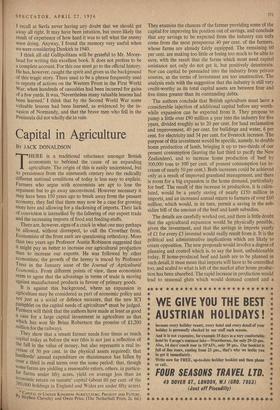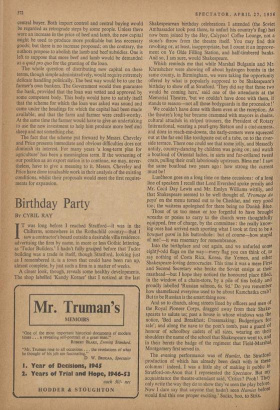Capital in Agriculture
13y JACK DONALDSON THERE is a traditional reluctance amongst British economists to befriend the cause of an expanding agriculture., The origin of this is easily understood, but its persistence from the nineteenth century into the radically different national conditions of today is less easy to explain. Farmers who argue with economists are apt to lose the argument but to go away unconvinced. However necessary it may have been 150 years ago to break away from the peasant economy, they feel that there may now be a case for growing more here and allowing for a slackening of imports. Their lack of conviction is intensified liy the faltering of our export trade and the increasing imports of food and feeding-stuffs.
There are, however, signs of a crack in what one may perhaps be allowed, without disrespect, 'to call the Crowther front. Economists of the front rank are questioning orthodoxy. More than two years ago Professor Austin Robinson suggested that it might pay us better to increase our agricultural production than to increase our exports. He was followed by other economists; the growth of the heresy is traced by Professor Tress in the January issue of the Journal of Agricultural Economics. From different, points of view, these economists seem to agree that the advantage in terms of trade is moving against manufactured products in favour of primary goods. It is against this background, where an expansion in agriculture may be considered as part of economic policy and not just as a social or defence measure, that the new ICI Pamphlet on the capital needs of agriculture* must be judged. Farmers will think that the authors have made at least as good a case for a large capital investment in agriculture as that which has won' Sir Brian Robertson the promise of £1,200 million for the railways. They show that a tenant farmer needs four times as much capital today as before the war (this is not just a reflection of the fall in the value of money, but also represents a real in- crease of 50 per cent. in the physical assets required); that landlords' annual expenditure on Maintenance has fallen by over a third in real terms over the same period; that, though some farms are yielding a reasonable return, others, in particu- lar farms under fifty acres, yield on average Jess than an economic return on tenants' capital (about 60 per cent. of the 380,000 holdings in England and Wales are under fifty acres).
.., ,APITAL IN UNITED KINGDOM AGRICULTURE, PRESENT AND FUTURE. DY Stephen Cheveley and Owen Price. (The Nctherhall Press, 2s. 6d) They examine the chances of the farmer providing some of the capital for improving his position out of savings, and conclude that any savings to be expected from the industry can only come, from the most prosperous 40 per cent. of the farmers, whose farms are already fairly equipped. The remaining 60 per cent. are making too little or losing too much to be able to save, with the result that the farms which most need capital assistance not, only do not get it, but positively deteriorate. Nor can capital be persuaded into the industry from private sources, as the terms of investment are too unattractive. The analysis ends with the suggestion that the industry is still very credit-worthy as its total capital assets are between four and five times greater than its outstanding debts.
The authors conclude that British agriculture must have a considerable injection of additional capital before any worth- while expansion can be expected from it. They propose to pump a little over £90 million a year into the industry for five years, divided roughly as to 20 per cent. for land reclamation and improvement, 40 per cent. for buildings and water, 6 per cent. for electricity and 34 per cent. for livestock increase. The purpose of this investment would be specific, namely, to double home production of lamb, bringing it up to two-thirds of our present consumption (leaving the last third to pacify the New Zealanders), and to increase home production of beef by 300,000 tons to 100 per cent. of present consumption (an in- crease of nearly 50 per cent.). Both increases could be achieved only as a result of improved grassland management, and there is 'room for a big expansion in the home demand, particularly for beef. The result of this increase in production, it is calcu- lated, would be a yearly saving of nearly £150 million in imports, and an increased annual return to farmers of over £60 million, which would, in its turn, permit a saving in the sub- sidies bill of the amount of the beef and lamb subsidies.
The details are carefully worked out, ancrthere is little doubt that the agricultural expansion would be physically possible, given the investment, and that the savings in imports yearly of £1 for every £3 invested would really result from it. It is the political and administrative implications which are likely to create opposition. The new proposals would involve a degree of planning and control which is, to say the least, unfashionable today. If home-produced beef and lamb are to be planned in such detail, it must mean that imports will have to be controlled too, and scaled to what is left of the market after home produc- tion has been absorbed. The rapid increase in production would lead to seasonal gluts which would demand control and a central buyer. Both import control and central buying would be regarded as retrograde steps by some people. Unless there wore an increase in the price of beef and lamb, the new capital might be used to produce more profitable but less necessary goods; but there is no increase proposed; on the contrary, the authors propose to abolish the lamb and beef subsidies. One is left to suppose that more beef and lamb would be demanded as a quid pro quo for the granting of the loan.
The whole question of distributing new capital on these terms, though simple administratively, would require extremely delicate handling politically. The best way would be to use the farmer's own bankers. The Government would then guarantee the bank, provided that the loan was vetted and approved by some competent body. This body would have to satisfy itself that the scheme for which the loan was asked was sound and came under the headings for which the capital had been made available; and that the farm and farmer were credit-worthy. At the same time the farmer would have to give an undertaking to use the new investment to help him produce more beef and sheep and not something else.
The fact that the scheme put forward by Messrs. Cheveley and Price presents immediate and obvious difficulties does not diminish its interest. For many years 'a long-term plan for agriculture' has been a meaningless term. If the worsening of our position as an export nation is to continue, we may, never- theless, have to give a meaning to it. Messrs. Cheveley and Price have done invaluable work in their analysis of the existing conditions, whilst their proposals would meet the first require- ments for expansion.











































 Previous page
Previous page